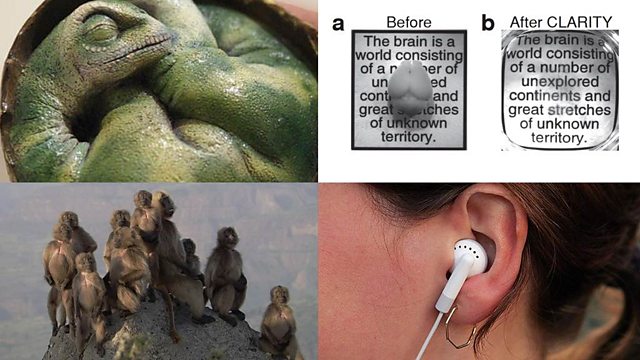Dinosaur Embryos
Exploring early embryonic development of dinosaurs; Making the brain transparent; Gelada baboons talk like humans; Appreciating music in the brain
Dinosaur embryos
Paleontologists have the rare opportunity to examine a cache of embryonic dinosaur fossilised bones. The embryos are probably Lufengosaurus, very early Sauropod type dinosaurs, which roamed in China over 190 million years ago. The researchers can tell from the bones that the tiny embryonic dinosaurs wriggled in their eggs and grew very fast.
Transparent Brain
Using a complex recipe called CLARITY, scientists at Stanford University have made a mouse brain completely transparent. The brain still maintains its internal microscopic structure making it ideal for post mortem study of the entire organ. The researchers say they can perform the technique on other organs such as liver and kidneys.
Human-like language in Gelada baboons
A bizarre sound made by a species of monkey, the Gelada baboon, found in Ethiopian highlands could help to reveal how human language evolved. Scientists say this is the first primate known to make calls that share certain features with human speech.
Appreciating new music in the brain
It’s no surprise that we find some types of music pleasurable and rewarding. When we hear a tune we like, the pleasure and reward centres of the brain are activated and the chemical dopamine released. But what part of the brain responds when we hear music we like for the first time? Scientists have found that the Nucleus Accumbens is activated in anticipation of pleasurable new music. And the amount of activity relates directly to how much the listener is willing to pay to hear the music again.
(Photo credits: Getty Images/Kwanghun Chung and Karl Deisseroth, Howard Hughes Medical Institute, Stanford University/Βι¶ΉΤΌΕΔ/Getty Images)
Last on
Chapters
-
Dinosaur Embryos
Charting early embryonic development of early Jurassic dinosaurs.
Duration: 04:59
Transparent Brain
Scientists have made a mouse brain completely transparent.
Duration: 04:53
Human-like language in Gelada baboons
A bizarre sound made by the Gelada baboon could help to reveal how human language evolved.
Duration: 03:53
Appreciating music in the brain
How the brain responds when we listen to music for the first time.
Duration: 03:20
Broadcasts
- Thu 11 Apr 2013 18:32GMTΒι¶ΉΤΌΕΔ World Service Online
- Fri 12 Apr 2013 01:32GMTΒι¶ΉΤΌΕΔ World Service Online
- Fri 12 Apr 2013 08:32GMTΒι¶ΉΤΌΕΔ World Service Online
- Sun 14 Apr 2013 04:32GMTΒι¶ΉΤΌΕΔ World Service Online
Podcast
-
![]()
Science In Action
The Βι¶ΉΤΌΕΔ brings you all the week's science news.


